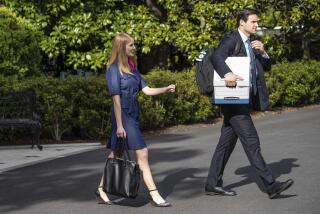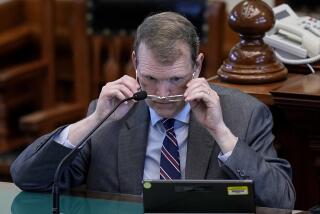Ex-Aide to Carpenter Takes Stand : Politics: Assistant to former senator testifies that the legislator sought to block bills sponsored by groups that had not contributed to his campaign.
- Share via
SACRAMENTO — Former Sen. Paul Carpenter frequently used legislation to raise campaign funds and occasionally sought to block bills sponsored by those who “had not been appreciative,” a former aide testified Wednesday.
Ida Lowe, who worked for the former legislator from 1977 to 1983, told a federal court jury that Carpenter directed his staff to keep track of legislation sponsored by interest groups that had not contributed to his campaign. Then, when the bills came before Carpenter in Senate committees, Lowe testified, the senator would raise sharp questions or vote against the bill.
“If they (interest groups) had not been appreciative, then you might need to get their attention,” she testified. “He was very successful . . . in getting their attention, which in turn could lead to a campaign contribution.”
Lowe’s testimony came on the third day of Carpenter’s trial on four counts of racketeering, attempted extortion and conspiracy that grew out of an FBI undercover investigation of Capitol corruption.
Defense attorney Gerard Hinckley sought to undermine Lowe’s testimony by pointing out that she was fired by the senator and by questioning her about a subsequent drug overdose. Hinckley also accused Lowe of bearing a grudge against Carpenter because the senator had dated another member of his staff while Lowe and Carpenter’s then-wife were close friends.
Lowe, who appeared distracted at times during her testimony, denied that she had any malice toward Carpenter. And she insisted that Carpenter used his sponsorship of legislation to extract campaign contributions from special-interest groups.
She said that Carpenter--now a member of the State Board of Equalization--used such terms as “money bill” to refer to legislation that could be used to solicit funds. Under questioning, she agreed that Carpenter used the term “charity” or “freebie” to refer to a measure unlikely to lead to campaign contributions.
Earlier in the day, Jay Michael, the top lobbyist for the California Medical Assn., testified that Carpenter once summoned him to the Capitol to urge that the doctors’ lobbying group increase its donations to Democratic members.
Michael said he was “intimidated” by Carpenter because the lawmaker held a leadership position in the Senate and sat on committees with a vital say in legislation affecting the medical group. As a result of the meeting, Michael said, he recommended that the organization increase its donations as Carpenter requested.
“If we failed to make the contributions then those (adversaries) who did make the contributions might find more receptivity,” he told the jury.
But Michael, a reluctant prosecution witness, offered few details of his meeting with Carpenter and did not link the demand for money to any specific legislation.
Michael acknowledged under questioning by U.S. Atty. John Panneton that he had agreed to take the stand only after receiving a grant of immunity if he were to implicate himself in a crime during his testimony.
The jury also heard the beginning of testimony from FBI Agent John E. Brennan, an undercover agent who was a key player in the Capitol sting investigation. Brennan began describing how the operation was set up and is expected to testify today about secret tape recordings of conversations involving Carpenter.
More to Read
Get the L.A. Times Politics newsletter
Deeply reported insights into legislation, politics and policy from Sacramento, Washington and beyond. In your inbox twice per week.
You may occasionally receive promotional content from the Los Angeles Times.










